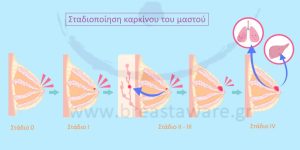
Breast Cancer Staging: How the Extent and Treatment of the Disease Are Determined
The breast cancer staging is a fundamental step in understanding the extent of the disease and choosing the right treatment. Based on the stage of the cancer, the prognosis, treatment strategy and the possibility of cure are determined.
What is the TNM system?
Modern staging is based on the international system TNM (Tumor–Node–Metastasis), which evaluates:
- T (Tumor): the size of the tumor and whether it is invasive or non-invasive (in situ)
- N (Node): Presence of cancer cells in the axillary (underarm) lymph nodes
- M (Metastasis): existence distant metastases in other organs (e.g. liver, bones, lungs)
Staging is done after Surgical removal or Biopsy of malignancy, in combination with imaging control of the rest of the body (mammography, ultrasound, MRI, positron emission tomography - PET).
Breast Cancer Stages
Breast cancer is classified into five stages (0 to IV):
Stage 0 (Carcinoma in situ):
Non-invasive cancer, such as DCIS (πορογενές καρκίνωμα in situ). It has excellent prognosis, as the cancer cells have not infiltrated the surrounding tissue.
Stages I and II:
Early stages of the disease. The tumor is confined to the breast or may have spread to a few axillary lymph nodes. Treatment includes surgery, radiotherapy and, depending on the characteristics of the tumor, chemotherapy or hormone therapy.
Stage III:
Locally advanced cancer without distant metastases. Often required preoperative (neoadjuvant) chemotherapy to reduce the tumor before surgery.
Stage IV (Metastatic cancer):
The disease has spread to other parts of the body. The goal of treatment is to prolong life and improve the patient's quality of life, with a combination of systemic therapies (chemotherapy, hormone therapy, targeted therapies).
Biological Characteristics Affecting Staging
Since 2018, staging is not only based on the anatomical extent of the disease, but also on biological markers, which provide additional information about the aggressiveness of the cancer and the potential response to treatment:
- Grade: How "immature" or aggressive the cancer cells appear
- Hormone receptors (ER/PR): Estrogen and progesterone receptor status
- HER2 status: Presence of the HER2 protein, guiding targeted therapies
- Genomic profiling (e.g., Oncotype DX): Tests predicting recurrence risk and chemotherapy benefit
This biological staging allows for a more personalized approach to treatment, increasing its effectiveness and avoiding unnecessary treatments.
Conclusion
The breast cancer staging is the "key" to the right treatment decision. By combining the anatomical extent of the disease with its biological characteristics, doctors can formulate personalized treatment plans with maximum efficiency.
Learn more at breastaware.gr
At www.breastaware.gr you will find reliable, clear information on breast cancer, diagnosis, available tests, and modern treatment options. Stay informed, empowered, and take an active role in your health.
References
- American Joint Committee on Cancer (AJCC) Cancer Staging Manual, 8th Edition
- National Comprehensive Cancer Network (NCCN) Guidelines – Breast Cancer
- American Cancer Society – Breast Cancer Stages
- European Society for Medical Oncology (ESMO) – Clinical Practice Guidelines
- Harbeck N. et al. Breast cancer. Nature Reviews Disease Primers (2019)
- Sparano JA et al. (2018). Adjuvant Chemotherapy Guided by a 21-Gene Expression Assay in Breast Cancer. New England Journal of Medicine.
